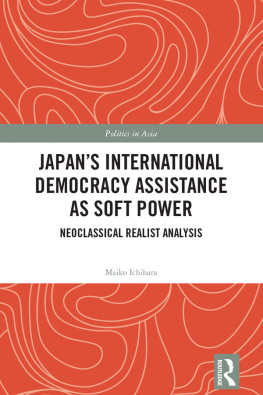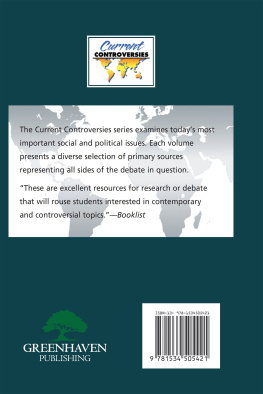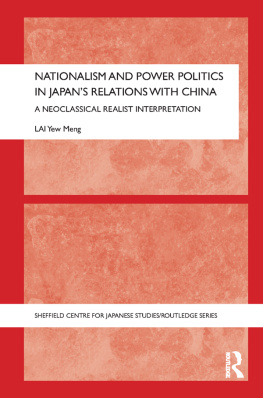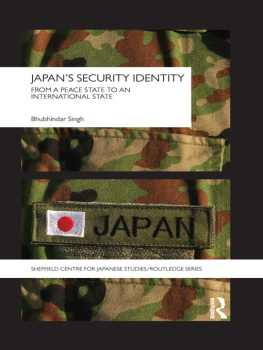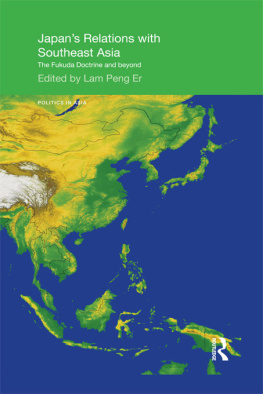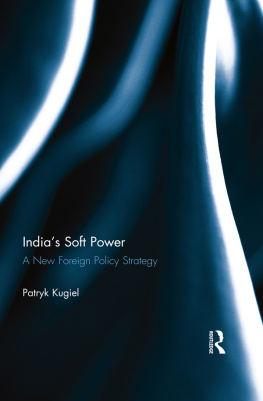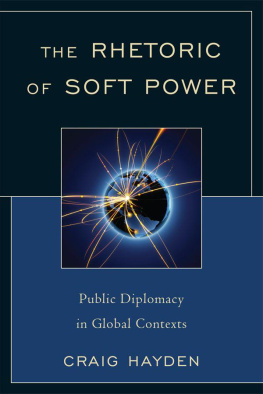Japans International Democracy Assistance as Soft Power
Japan has increasingly emphasized democracy assistance since the mid-2000s, such that it now constitutes a major part of Japans foreign policy. This approach is an ostensible departure from the countrys traditional foreign policy stance, which tries to avoid bringing values to the forefront of foreign policies. This book intends to answer the questions of why Japan has started emphasizing democracy assistance and why it has relegated itself to a minor role in democracy assistance nevertheless. It argues that Japans emphasis on democracy assistance reveals its intention to increase its political influence vis-a-vis China based on democratic values, and its usage of the term democracy assistance is a performative speech act to justify and orchestrate a comprehensive approach for international democracy support. Shedding light on the novel aspect of Japanese policy, this book contributes to the understanding of Japanese foreign policy and democracy promotion. Providing the analysis that a states speech act could cause the creation of foreign policies that counter what is predicted by structural realism, this analysis makes contributions to neoclassical realism, which explains states foreign policy choices within the constraints of the international structure.
Maiko Ichihara is associate professor of Graduate School of Law and School of International and Public Policy at Hitotsubashi University, Japan.
Politics in Asia
For a full list of titles in this series, please visit www.routledge.com/Politics-in-Asia/book-series/PIA
Governing Global-City Singapore
Legacies and Futures After Lee Kuan Yew
Kenneth Paul Tan
Negotiating the U.S.-Japan Alliance
Japan Confidential
Yukinori Komine
Chinese Foreign Policy Under Xi
Edited by Hoo Tiang Boon
A History of Human Rights Society in Singapore
19652015
Edited by Jiyoung Song
Japans Security and Economic Dependence on China and the United states
Cool Politics, Lukewarm Economics
Keisuke Iida
Japan and the Shaping of Post-Vietnam War Southeast Asia
Japanese Diplomacy and the Cambodian Conflict, 19781993
Andrea Pressello
Japans International Democracy Assistance as Soft Power
Neoclassical Realist Analysis
Maiko Ichihara
Reimagining Nation and Nationalism in Multicultural East Asia
Edited by Sungmoon Kim and Hsin-wen Lee
Japans International Democracy Assistance as Soft Power
Neoclassical Realist Analysis
Maiko Ichihara
First published 2018
by Routledge
2 Park Square, Milton Park, Abingdon, Oxon OX14 4RN
and by Routledge
711 Third Avenue, New York, NY 10017
Routledge is an imprint of the Taylor & Francis Group, an informa business
2018 Maiko Ichihara
The right of Maiko Ichihara to be identified as author of this work has been asserted by her in accordance with sections 77 and 78 of the Copyright, Designs and Patents Act 1988.
All rights reserved. No part of this book may be reprinted or reproduced or utilised in any form or by any electronic, mechanical, or other means, now known or hereafter invented, including photocopying and recording, or in any information storage or retrieval system, without permission in writing from the publishers.
Trademark notice: Product or corporate names may be trademarks or registered trademarks, and are used only for identification and explanation without intent to infringe.
British Library Cataloguing-in-Publication Data
A catalogue record for this book is available from the British Library
Library of Congress Cataloging-in-Publication Data
A catalog record for this book has been requested
ISBN: 978-1-138-95705-3 (hbk)
ISBN: 978-1-315-66536-8 (ebk)
Typeset in Galliard
by Apex CoVantage, LLC
This project started by my gaining inspiration from an encounter with a number of civil society actors in Indonesia who were working to improve their democracy. They are eager to push the government from without and work with the government from within to achieve that goal. They have a number of the best and brightest of Indonesia and thus possess expertise in a variety of fields, including law, elections, and human rights.
However, they lack funding. This issue drove me to ask about the origins of their funding. Soon I discovered that they obtained funding from such sources as the Asia Foundation, the Australian Agency for International Development, the European Union, the National Endowment for Democracy, the Netherlands Organization for International Development Cooperation, and the United States Agency for International Development. The second question that occurred to me as a Japanese was, Where is Japan? This question was intriguing because Japans values-based diplomacy shows commitment to democracy assistance. The fact that Japan is the biggest donor to Indonesia deepened my question.
There are quite a number of people who regard democracy assistance as a kind of conspiracy for the purpose of overthrowing governments. However, given the eagerness of civil society actors in Indonesia to improve their democracy, I realized that democracy assistance cannot be rejected so easily. Substantial numbers of people in Indonesian society are committed to secure transparency, accountability, and citizen participation in governance. People are working to ensure freedom. Many of them are those who held pro-democracy demonstrations during the authoritarian regime under Suharto, risking their lives in the process. While living expenses in Jakarta, the capital of Indonesia, are becoming costlier, these NGO actors live with a salary that is far from sufficient. They are serious to the extent that they risk their lives daily for a better future for Indonesia. The existence of these active pro-democracy actors was clearly indispensable for democratization, the improvement of democratic quality, and the democracy consolidation of the country.
After beginning my research on Japans democracy support and participating in conferences on the issue, additional inspiration came to me from a conference held by the Sasakawa Peace Foundation USA, the Freedom House, and the East-West Center of the University of Hawaii in 2014. Practitioners and scholars in the field of democracy support gathered from the United States and Japan and had an intense two-day discussion about the ways in which the two countries could and should cooperate to support democracy internationally. However, the way the Japanese participants used the term democracy assistance confused the American participants because the Japanese discussed assistance not only for elections, the judiciary, and the civil society but also for social and economic infrastructure. I started wondering what democracy assistance meant for the Japanese, and thats when my journey to this book started.
Some parts of the arguments in this book have already appeared in my previous publications: Japanese Democracy Assistance: Weak Involvement of Civil Society Actors, my PhD dissertation submitted to the George Washington University (May 2012); Understanding Japanese Democracy Assistance, The Carnegie Papers (2013), pp. 127; Japans Strategic Approach to Democracy Support, Carnegie Endowment for International Peace (2014); Japans Faltering Support for Burmese Democracy, Carnegie Endowment for International Peace (2015); and Japans Democracy Support to Indonesia: Weak Involvement of Civil Society Actors,


